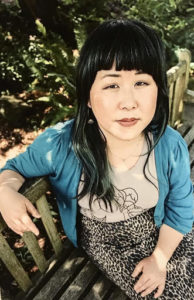Zines are fascinating primary sources for self-expression, creativity, engagement, and research. They are self-published works that often include a variety of texts and images on any topic such as health, literature, activism, science fiction, and many more. They can provide useful perspectives and can be written by marginalized voices who are often not included or cited in scholarly resources. They can also encourage readers to visualize and think about the topics and how they are reflective to their own experiences and the experiences of others. Many libraries have been adding zines to their collection, and some librarians have even organized zine events where participants can create their own zines. During the pandemic, libraries have organized online zine workshops. In this interview, librarian Ann Matsushima Chiu shares her interests and experiences in supporting zines in library instruction and programming.
Ray: Thanks for speaking with us! Can you tell us your current work and how you got interested in zines?
Ann: Currently I work as the Social Sciences Librarian at Reed College in Portland, Oregon, where I teach library instruction and research skills. I did my undergraduate degree in Visual Arts and became interested in zines as I grew attracted to art as social practice. Zines are very inclusive and welcome a variety of skill levels and interests, as it is a very accessible format that is affordable to produce and easy to do it yourself. With its roots in punk, zines and independent publishing have given space for culturally subversive, alternative, experimental, and marginalized voices to be heard and experienced. I like to refer to zines as “grassroots literacies,” which play an important role in diversifying and decolonizing library collections.
I have been making zines for the past decade about my culture, my family, and my personal experiences around abortion, becoming a mother, and being a Asian-American woman of color. For the past several years, I have become involved with organizing various zine festivals and symposiums, and more recently have begun merging my librarianship and zine knowledge together.
Ray: From your experiences, how can zines be incorporated into library instruction?
Ann: I teach with zines in different contexts, from college classes to community youth programming. As I have advocated incorporating zines in the classroom, I am finding professors are willing to work with me in these three ways.
- Zines 101 workshop: This is your basic zine introductory workshop. It is more hands-on and often involves the art-making process with collaging materials, folding techniques, writing prompts, and an overview of zines and independent publishing. At Reed College, we host these outside of class time, but classes that are incorporating the option of making a zine as a final project often encourage their students to come. Some examples of courses that have been open to zines have been an Anthropology Media and Publics course, a Wellness course, and a Religion and Social Justice course, as well as classes geared for first-year students. You can also collaborate with clubs and student organizations and host more targeted workshops.
- Zines to teach information literacy concepts: One of the ways that I teach information seeking and gathering utilizes zines in the classroom. Often I bring a large stack from the collection that have intersectional topics and themes and allow students to pick one or two that catch their attention. Because professors usually request that I guide students in how to find journal articles through databases, I have found that the intersectionality of themes found in zines gives students interesting examples of search terms and keywords to explore through electronic resources. Students are then tasked to find a few journal articles related to the themes in their zine. Students will also be asked to attempt to locate the zine in the library catalog or WorldCat, as well as to attempt to find an eBook related to one or more of the zine’s themes. I haven’t yet done this in online library instruction, but I imagine that you could use the POC Zine Project or Queer Zine Archive Project (QZAP) digitized zine collections if getting physical items in the hands of students is more challenging in COVID times.
- “Zine-in-a-Hurry”: This workshop format is one that I have done for the past several years, and it works well in classrooms, as well in the community. The first one I co-facilitated with mix media artist Van Tran, was at Portland Zine Symposium 2016. This is a timed session (usually one-hour long), where participants collaborate on a zine to completion, meaning within the hour, participants create art, photocopy, collate, staple, and disseminate. I give the participants 15 to 20 minutes to get creative with half of a piece of blank computer paper (8.5’’ x 5.5’’). Then they switch with someone else and complete the other half of the paper for another 15 to 20 minutes. I only host these workshops if I have access to a photocopy machine that makes double-sided photocopies. You will need a long-arm stapler as well. For the cover, I often have each participant cut out a word or an image, and as a group we collage a meaningful cover. I also have them sign the back cover so I have a record of the participants. Each participant should leave with a zine at the end of the session, so you have to work fast! Here is news coverage of a “Zine-in-a-Hurry” that I hosted with the Asian Leaders for the Liberation of Youth (ALLY). Here is another example of the zine I co-facilitated at ACRL Cleveland in 2019.
Resources to support information literacy—and so much more!
Check them out today.
Ray: Those are really great tips! What are you working on next with zines? Do you see anything you’d like to experiment with?

The Reed Zine Library
Ann: In 2017, I published a chapter entitled “Engaging the Future of Zine Librarianship” in Yago Cura & Max Macias’ Librarians with Spines: Information Agitators in an Age of Stagnation. Here I interviewed two zine librarians, one working in an academic library and one working in a public library.
My colleague Maria Cunningham (who founded the Reed Zine Library) and I have a forthcoming chapter about how zines in academic libraries disrupt and diversify collection development practices and introduce new avenues for student and community research and artistic expression through creativity, library outreach, and social justice. It’s coming soon, and we are excited about it!

Ann Matsushima Chiu (Photo Credit: Roslyn Banish)
I would like to continue interviewing other zine librarians, some of whom are teaching zines in library instruction, some who work as librarians as well as organize zine fests, zine-making events as library programming and outreach, etc. I also make zines regarding reproductive justice issues, particularly around abortion for Asian-American women. I would like to continue to advocate for zine-making as a tool for social justice and constructivist learning. Zines are powerful, and I encourage you to use zines in your instruction if you have not yet!
Ann Matsushima Chiu (she/they), also known as A’misa in the zine community, is the Social Sciences Librarian at Reed College in Portland, OR. Ann teaches instruction and critical-thinking skills through zines and guided inquiry, leads zine workshops in the community, and has organized zine fests and events for more than a decade.
See also:
- Hosting a Meme Contest for Your Library? Give It a Try!
- Have You Seen the Library Video Gone Viral? Video-Creating Resources for Fun!
- Digital Storytelling: Resources for You and Your Library to Consider
- Beyond Discussion Boards: Applying Interactive Tools and Assignments for Learning
- It’s Here! In-Depth Guidance for Conducting Online Information Literacy Classes


